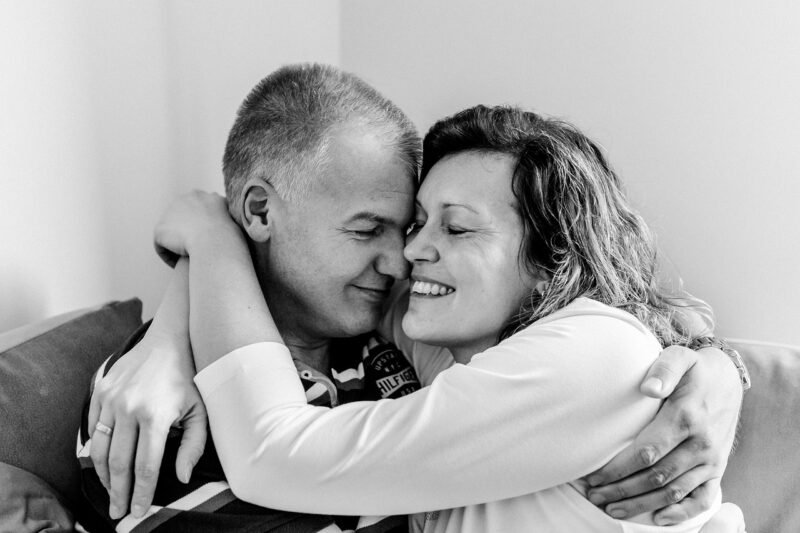Introduction: The Comfort Trap
Becoming too comfortable in a marriage is an often overlooked yet critical reality that can significantly impact the health and longevity of any relationship, especially marriage.
Obviously, comfort and stability are essential for fostering a strong connection between new partners in the initial stage of a romantic relationship. They usually contribute to a sense of security, allowing couples to build a solid foundation and navigate life’s challenges together.
However, a subtle shift can occur over time, and this comfort gradually morphs into complacency, which can become a dangerous slip-and-slide.
Complacency in marriage is insidious and dangerous because it often goes unnoticed until it has deeply rooted itself within the relationship.
When partners become too comfortable, they may start to take each other for granted, neglect personal growth, or ignore the need for continuous effort to maintain the relationship’s vibrancy.
This stagnation can easily lead to a decline in emotional connection, reduced communication, and, ultimately, a weakened partnership.
Now, ignoring the early signs of complacency can have far-reaching consequences.
Over time, the lack of attention and effort can create a rift between partners, leading to feelings of dissatisfaction, resentment, and even the dissolution of the marriage.
It is, therefore, crucial to recognize and address these signs proactively to prevent the relationship from deteriorating.
So, with that in mind, this blog post will outline 10 common signs that indicate you might be becoming too comfortable in your marriage.
By identifying these signs early and taking appropriate measures to counteract them, as a couple, you can ensure your relationship remains dynamic, fulfilling, and resilient.
At the end of the day, understanding and addressing these warning signals is critical to maintaining a healthy and happy marriage.
Sign 1: Taking Each Other for Granted
In the early stages of marriage, partners often express gratitude and appreciation for each other’s efforts.
However, as time progresses, the familiarity and routine of daily life can often lead to a gradual erosion of these expressions.
This gradual decline often manifests in simple actions such as forgetting to say ‘thank you’ or not acknowledging the little things your partner does.
If left unchecked, this behaviour can start to significantly undermine a relationship’s foundation of gratitude and respect.

So, why does that happen in the first place?
In essence, taking each other for granted typically happens because of a sense of security and predictability that develops over time.
Now, while feeling secure in a relationship can be beneficial, it can also lead to complacency—it’s like a double-edged sword.
Partners may begin to assume that their spouse will always be there, which can result in a lack of effort to show appreciation. This oversight can easily create feelings of neglect and undervalue, potentially breeding resentment.
To counteract this, couples should consciously practice daily gratitude.
Making it a habit to say ‘thank you’ for even the smallest gestures can go a long way in reinforcing appreciation.
Verbal affirmations especially play a crucial role in this practice.
Simple statements like “I appreciate you making dinner” or “Thank you for taking care of the kids today” go a long way to fostering a positive and appreciative environment.
Additionally, acknowledging each other’s efforts regularly is vital.
This can be done through small acts of kindness, such as leaving a note of appreciation or taking over a chore to give your partner a break.
Regularly scheduled check-ins where both partners share what they appreciate about each other can also be beneficial.
These practices not only reinforce a culture of gratitude but also help recognize and value the continuous efforts made by both partners in maintaining the relationship, which goes a long way in signalling an enduring commitment to the marriage.
Sign 2: Lack of Physical Intimacy
Physical intimacy is a vital component of marriage, typically fostering an emotional connection between spouses and strengthening their marital bond.
However, when couples rarely hug, kiss, or are physically close, their emotional connection can gradually erode, causing the marriage to crumble as well.

But physical intimacy is not merely about sexual interaction (although that too); it encompasses all forms of touch and closeness that reinforce the sense of love and affection between partners.
At its essence, a lack of physical intimacy typically creates a sense of distance and detachment, making partners feel isolated.
This detachment can then inadvertently give rise to misunderstandings and emotional disconnect, a type of underlying dissatisfaction with the relationship that affects everything, even non-physical matters.
Therefore, maintaining physical intimacy is crucial in ensuring that the emotional bond between partners remains robust and resilient, whether you’re married for a year or 50 years. The principles remain true for ALL married couples.
Simple acts of touch, such as holding hands, a gentle pat on the back, or a warm embrace, can significantly enhance feelings of closeness and security.
So, to counteract the lack of physical intimacy, couples can take proactive measures.
One effective strategy is to schedule regular physical affection.
Now, this does not necessarily mean planning elaborate activities; even small, consistent gestures of affection can make a substantial difference.
Creating intimate moments, such as sharing a quiet evening together or engaging in activities that both partners enjoy, can also reignite the spark of physical closeness.
Moreover, open communication about needs and desires is paramount.
Partners should feel comfortable discussing their physical intimacy needs without fear of judgment.
This openness can lead to a better understanding of each other’s expectations and preferences and give a couple the insights necessary to do the things that will build a more satisfying and intimate relationship.

Therefore, encouraging each other to express feelings and desires candidly can pave the way for a deeper emotional connection and a more fulfilling marital experience.
In essence, prioritizing physical intimacy is indispensable for maintaining a healthy and emotionally connected marriage.
Sign 3: Poor Communication
Poor (or no) communication is another one of the insidiously dangerous signs that a marriage may be becoming too comfortable.
When partners stop talking about their day or sharing their feelings, misunderstandings can arise, leading to emotional distance.
Consequently, effective communication is the backbone of any strong relationship, and without it, couples may find themselves drifting apart.
When daily interactions become limited to logistical discussions or surface-level conversations, partners start to miss the opportunity to truly understand each other’s thoughts and emotions, which limits their ability to meet each other’s needs adequately.
This lack of depth can then cause feelings of isolation and resentment. Additionally, when concerns or grievances are not openly discussed, they can fester and escalate into more significant conflicts.
As a whole, these factors can contribute to an unhealthy and unsustainable overall state of the relationship.
To counteract poor communication, it is essential to prioritize regular, meaningful conversations.
That means setting aside dedicated time each day to talk about your experiences, emotions, and thoughts to help build and maintain a strong emotional connection.
Active listening is another crucial strategy in this regard.
It involves fully concentrating, understanding, and responding thoughtfully to your partner’s words, thereby validating their feelings and demonstrating empathy.
Using ‘I’ statements is also an effective communication technique.
Instead of saying, “You never listen to me,” which can come off as accusatory, it’s better to express your feelings with statements like, “I feel unheard when we don’t discuss our days.” This tends to reduce defensiveness and opens the door to more constructive dialogue.
Now, another communication issue and a possible sign of becoming too comfortable in marriage is the tendency to avoid conflict.

When partners choose to sidestep disagreements rather than address them, unresolved issues tend to start accumulating over time, often resulting in hidden resentment.
This buried tension can then erode the foundation of the relationship, leading to potential outbursts and a further breakdown in communication and connection.
Avoiding conflict may seem like a way to maintain peace, but it often has the opposite effect.
Without addressing problems head-on, couples miss the opportunity to understand each other’s perspectives and find mutual solutions.
This pattern of avoidance can also easily create an environment where minor issues escalate into major problems, further straining the relationship.
Thus, conflict resolution is essential for a healthy marriage.
It allows partners to express their feelings, thoughts, and concerns openly, fostering mutual respect and understanding.
Moreover, addressing issues promptly is crucial to prevent them from snowballing into larger conflicts.
But…practising compromise is a vital technique for conflict resolution; something many couples struggle with at times.
The reality is, though, marriage is a partnership that usually requires give-and-take from both sides.
Finding a compromise where both partners feel satisfied is the only way to strengthen your bond as a couple and promote teamwork.
But practical compromise involves active listening, empathy, and a willingness to meet each other halfway, and that can be tough for many.
In some cases, seeking professional help through couples’ therapy can be beneficial.
A trained therapist can provide tools and strategies to navigate conflicts constructively.
Therapy also offers a safe space for partners to explore their issues, improve communication skills, and build a stronger, more resilient relationship.
Ultimately, however, the big takeaway here is that avoiding conflict can be a dangerous sign of complacency in marriage.
Sign 5: Neglecting Personal Appearance
It’s easy for couples who have become complacent in long-term relationships to start neglecting their personal appearance.

When partners stop making an effort to look nice for each other, it can have a detrimental effect on both attraction and self-esteem.
The psychological impact of personal appearance in a relationship cannot be underestimated.
Feeling unappreciated or unattractive can often grow resentment and diminish the emotional connection between partners, so maintaining personal appearance is crucial for sustaining the spark in a marriage.
But it goes beyond mere vanity; it’s about showing respect and care for one’s partner.
A decline in personal grooming can also lead to decreased personal self-worth, ultimately affecting the overall health of the relationship.
It’s important to remember that taking care of oneself not only benefits you as an individual but also signals to your partner that they are valued and worth the effort.
So, to counteract this insidious sign, couples should prioritize personal hygiene and make time for self-care.
When individuals overlook their own health and wellness, it can often lead to elevated stress levels, reduced emotional resilience, and an overall inability to effectively support one another in a marriage.
Self-care, therefore, is not merely a personal luxury; it is a foundational component of a healthy, thriving relationship.
Also, the implications of ignoring self-care are multifaceted.
For instance, physically, it can manifest as chronic fatigue, weight gain, or various health issues that can strain the relationship.

Mentally, it can result in heightened anxiety, depression, or burnout, all of which can diminish one’s capacity to engage positively with a partner.
Emotionally, a lack of self-care can erode self-esteem and lead to feelings of resentment or dissatisfaction, creating further friction within the marriage.
So, as you can see, self-care is absolutely vital to one’s own well-being and the well-being of the marriage.
Now, prioritizing your physical health is a critical step in maintaining self-care.
That means regular exercise, balanced nutrition, and sufficient sleep are essential practices that enhance individual well-being and contribute to a more harmonious relationship.
So, engaging in physical activities together, such as hiking or going to the gym, can strengthen your bond while promoting healthy habits.

But mental well-being is equally important.
Thus, making time for relaxation, hobbies, and mindfulness practices can significantly reduce stress and improve emotional stability.
You can also encourage each other to take breaks, pursue personal interests, and seek professional help when needed, which will foster an environment of mutual support and understanding.
Ultimately, however, to cultivate a culture of self-care within a marriage, it is vital to encourage and model these behaviours for one another.
And simple acts of kindness, such as preparing a healthy meal or planning a relaxing weekend getaway, can demonstrate care and appreciation.
Also, regularly discussing your needs and boundaries with your partner can ensure that you are both attuned to each other’s well-being.
In essence, maintaining personal appearance and practicing self-care are shared responsibilities that foster a healthier, more vibrant relationship.
Sign 6: Living Separate Lives
Another one of the more subtle yet insidiously dangerous signs of becoming too comfortable in marriage is the gradual drift towards living separate lives.
This often manifests as spending minimal time together and pursuing different interests, which can eventually lead to the feeling of being mere roommates rather than romantic partners.
While individual interests and personal space are essential, an excessive (and exclusive) focus on them can erode the emotional and relational bonds that are crucial for any healthy marriage.
Shared experiences play a pivotal role in maintaining and strengthening the connection between spouses.
Dr. Gottman often discusses the notion of creating shared meaning as one component of the foundation of a healthy relationship.
They essentially provide opportunities for creating memories, fostering intimacy, and reinforcing the sense of partnership.
When couples engage in activities together, they not only enjoy each other’s company but also build a shared narrative that deepens their relationship.
Without these communal experiences, however, the risk of emotional detachment and growing apart becomes significantly higher.

To counteract the tendency of living separate lives, couples should actively plan joint activities that both partners can enjoy.
That could range from simple activities like cooking a meal together or taking a walk to more elaborate plans such as travelling or taking up a new hobby as a pair.
Finding common hobbies is particularly beneficial as it provides regular, structured time for interaction and shared enjoyment.
The essential principle here is to ensure regular quality time together is essential.
This doesn’t necessarily mean spending every waking moment in each other’s company but dedicating specific times to connect without distractions.
For example, date nights, weekend getaways, or even daily check-ins can all be effective strategies to maintain the emotional and communicative bond.
The point is that by prioritizing these shared experiences, couples can safeguard their relationship from the pitfalls of living separate lives and continue to feel connected and grow together in their marriage.
Sign 7: Routine Over Romance
In any long-term relationship, it’s natural for everyday chores and routines to start dominating the landscape.
It’s part of creating a sense of security, predictability, and stability, all necessary for a healthy relationship.
However, allowing these routines to begin to overshadow romance completely, can eventually lead to a monotonous and uninspiring relationship.
When a marriage becomes overly predictable, the excitement and passion that once fueled the bond can gradually fade away.
This is why it is essential to strike a balance between the monotony of daily routines and romantic gestures to ensure that the spark remains alive.

Routine tasks such as managing finances, household chores, and parental responsibilities are necessary, yet they should not consume all the attention.
Ignoring the need for romance can create a sense of emotional distance, making the relationship feel more like a partnership of convenience rather than a loving union.
So, to counteract this, couples must consciously infuse their daily lives with moments of unexpected joy and affection.
One effective way to rekindle romance is by surprising each other.
Small gestures, such as leaving love notes, buying the other chocolate or flowers, planning a surprise dinner, or gifting something meaningful, can all make a significant difference.
These surprises need not be extravagant; it’s the thoughtfulness behind them often matters more.
Another approach is to plan romantic getaways, even if they are short weekend trips.
Escaping your usual and predictable environment can allow couples to reconnect and appreciate each other’s company without the distractions of everyday life.
Doing that can go a long way in sparking romance and intimacy, not to mention rejuvenate your soul.
Also, keeping the element of surprise alive can be as simple as breaking the routine.
Trying new activities together, for example, can create shared experiences that bring couples closer.
And these activities not only add excitement but also provide opportunities to learn and grow together again, maintaining the relationship’s vibrancy.
Focusing on something new together has the potential to spark a sense of adventure and excitement, which can go a long way toward fueling positive vibes in a relationship.
Ultimately, balancing routine with romance requires effort and intentionality.
Those are key!
By making room for unexpected gestures and shared adventures, you can prevent your relationship from becoming stagnant and keep the flame of romance burning brightly.
Sign 8: Sticking to Rigid Roles
In many marriages, couples often fall into specific, predefined roles.

While having a clear division of responsibilities can initially seem practical, it could sometimes or eventually lead to feelings of frustration and resentment.
When partners stick rigidly to their ‘assigned’ chores or tasks, it can often create a perceived imbalance, where one party feels overburdened while the other feels underappreciated, which can become a problem.
Not only can this lack of flexibility stifle the growth of the relationship, but it can also create frustration and even resentment, making it vital to reassess and adapt these roles over time.
Flexibility and teamwork are key components of a strong and enduring relationship, not rigidity and selfishness.
By often sharing responsibilities and rotating tasks, couples can ensure that neither partner feels overwhelmed.
This approach will do more to create a sense of equality and mutual respect in the relationship.
For example, if one partner typically handles all the cooking, consider swapping roles occasionally or cooking together to share the load.
This not only lightens the burden but also provides an opportunity for bonding and collaboration.

Another effective strategy is to support each other in various roles.
Instead of adhering strictly to who does what, couples should strive to be adaptable and assist each other as needed.
This might mean stepping in to help with household chores, childcare, or even career-related tasks when one partner is particularly busy or stressed.
Such acts of support can significantly enhance your relationship by demonstrating commitment and understanding.
But communication plays a crucial role in this process.
Openly discussing each partner’s workload and finding a balanced approach to sharing responsibilities can prevent misunderstandings and ensure that both parties feel valued.
Also, regularly revisiting and adjusting roles as life circumstances change—such as the arrival of a new baby or a job change—can help maintain this balance.
Ultimately, avoiding rigid roles and embracing flexibility can lead to a more harmonious and supportive partnership.
By working together and showing a willingness to adapt, you can strengthen your bond and create a more equitable and fulfilling marriage where both partners feel valued and things are fair.
Sign 9: Hiding Money Matters
Financial transparency is a cornerstone of any healthy marriage.
It typically involves openly discussing financial decisions, sharing financial information, and jointly managing finances.
This transparency usually ensures that both partners have a clear understanding of the family’s current financial situation and encourages a fair and equitable approach to money management, meaning how money is managed and used is ultimately in such a way that it benefits or does not harm the marriage.
So, when partners start hiding money matters, it can quickly lead to a breakdown of trust and open the door to frequent arguments.
Financial secrets, such as undisclosed debts, hidden savings, or unspoken spending habits, can create a sense of betrayal that is often hard to overcome.
Moreover, this erosion of trust can ultimately damage a marriage’s foundation, leading to feelings of insecurity and resentment and the eventual breakdown of the relationship itself.

Therefore, with that in mind, regular financial discussions should be a staple in any marriage.
But these discussions should not only focus on current expenses but also on future financial goals and plans.
By jointly setting financial goals, a couple can work together towards a shared vision, which will ultimately strengthen their bond and ensure that both are on the same page and heading in the same direction.
In addition to regular discussions, creating a budget together can also help maintain financial transparency.
A joint budget and account allow both partners to see where money is being spent and help them make informed decisions about savings and expenditures.
This practice typically reduces the likelihood of financial surprises and fosters a collaborative approach to managing finances.
Now, if financial transparency is challenging, seeking professional help might be beneficial.
Financial counselling can help couples develop strategies for managing their finances more effectively and understanding each other’s financial perspectives.
A financial counsellor or mentor can act as a neutral third party, facilitating discussions and helping couples address underlying financial issues.
Ultimately, the key to preventing financial secrecy lies in continuous, honest communication and a willingness to work together towards shared financial goals.
By prioritizing financial transparency, you can avoid the pitfalls of hidden money matters and build a more secure and trusting relationship.
Sign 10: Losing Your Own Interests
The final insidious sign of becoming too comfortable in a marriage that I want to mention is the gradual loss of your own interests.
This is sort of the opposite side of the coin at #6: Living separate lives.
When individuals start to abandon their hobbies and social circles, they may find themselves feeling increasingly dependent on their spouse and ultimately unfulfilled.
They become so enmeshed that they lose their sense of personal identity and what brings them joy apart from their spouse.
This dependency can then also lead to a lack of personal growth and a skewed balance in the relationship, where one partner may feel overwhelmed by the pressure to meet all of the other’s emotional and social needs.

Maintaining individual interests is crucial for personal development and the health of the marriage.
Engaging in activities that you are passionate about can provide a sense of accomplishment and joy, which is essential for your well-being.
But it also allows for a richer, more diverse life experience, making you a more interesting and fulfilled partner.
So, to counteract this problem, it is important to carve out time for your own interests. Simple as that.
Whether you pursue a hobby, spend time with friends, or engage in professional development, these activities can help you maintain your individuality within the marriage.
This, in turn, can lead to a more balanced and satisfying relationship.
Now, couples can support each other in this endeavour by encouraging and respecting each other’s need for personal time.
Some practical ways to do that include setting aside specific times each week for individual activities, showing genuine interest in each other’s pursuits, and celebrating each other’s achievements outside the marriage.
By nurturing your own interests while supporting your partner’s, you essentially build a relationship that thrives on both shared and individual experiences.
Also, by prioritizing and supporting individual passions, you can ensure that your marriage remains dynamic and rewarding, allowing both of you to grow and flourish together.
Avoid falling into the trap of believing that giving up your dreams for your spouse or marriage is a good idea—it’s exactly the opposite.
Conclusion: Rekindling the Spark
So, throughout this article, we have delved into the subtle yet insidiously dangerous signs of becoming too comfortable in marriage.
A big takeaway is the idea that recognizing these signs is the first step towards fostering a healthier and more vibrant relationship.
From neglecting personal growth and communication to taking each other for granted, the pitfalls of complacency can quietly erode a partnership’s foundation.
However, understanding these potential issues can empower you as a couple to take proactive measures.
Yet, maintaining a healthy marriage requires vigilance and a commitment to ongoing effort. No happy, healthy, and intimate marriage just happens.
Therefore, regularly assessing the state of your relationship can help you identify areas that need attention right now.
And in that process, open communication is paramount because discussing your feelings, expectations, and concerns will help foster a deeper connection and mutual understanding with your spouse.
It is also crucial to make consistent efforts to keep the spark alive between you, whether through shared activities, date nights, or simple gestures of appreciation.
No gesture is too small or insignificant.
Never underestimate the power of small, consistent actions in maintaining a loving and dynamic marriage.
The effort invested in nurturing your relationship today can yield a lifetime of happiness and companionship.
So, take the time to reflect, communicate, and cherish each other.
The rewards of a healthy and happy marriage are well worth the effort.


